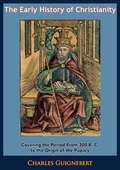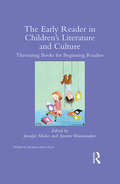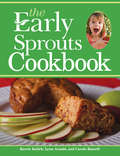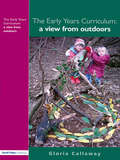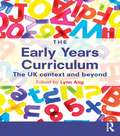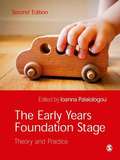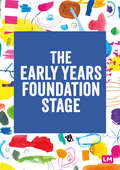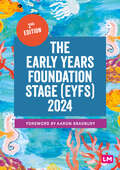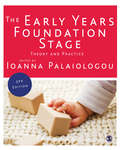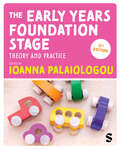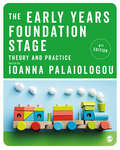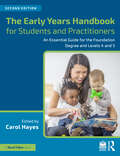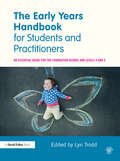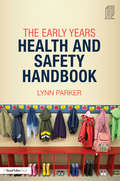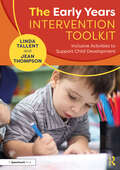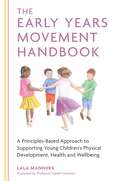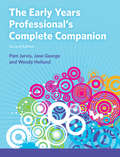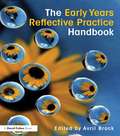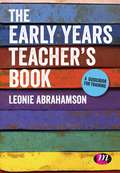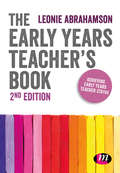- Table View
- List View
The Early History of Christianity: Covering the Period From 300 B. C. to the Origin of the Papacy
by Charles GuignebertChristian scholar Charles Guignebert (1867—1939) lectured extensively on Christian history at the Sorbonne, and conducted a 23 year long "seminar" on the New Testament. In this extensive work, Guignebert illuminates early history of Christianity, through its formation to the dominance of Catholic Church in Europe.
The Early Reader in Children's Literature and Culture: Theorizing Books for Beginning Readers (Children's Literature and Culture)
by Jennifer Miskec Annette WannamakerThis is the first volume to consider the popular literary category of Early Readers – books written and designed for children who are just beginning to read independently. It argues that Early Readers deserve more scholarly attention and careful thought because they are, for many younger readers, their first opportunity to engage with a work of literature on their own, to feel a sense of mastery over a text, and to experience pleasure from the act of reading independently. Using interdisciplinary approaches that draw upon and synthesize research being done in education, child psychology, sociology, cultural studies, and children’s literature, the volume visits Early Readers from a variety of angles: as teaching tools; as cultural artifacts that shape cultural and individual subjectivity; as mass produced products sold to a niche market of parents, educators, and young children; and as aesthetic objects, works of literature and art with specific conventions. Examining the reasons such books are so popular with young readers, as well as the reasons that some adults challenge and censor them, the volume considers the ways Early Readers contribute to the construction of younger children as readers, thinkers, consumers, and as gendered, raced, classed subjects. It also addresses children’s texts that have been translated and sold around the globe, examining them as part of an increasingly transnational children’s media culture that may add to or supplant regional, ethnic, and national children’s literatures and cultures. While this collection focuses mostly on books written in English and often aimed at children living in the US, it is important to acknowledge that these Early Readers are a major US cultural export, influencing the reading habits and development of children across the globe.
The Early Sprouts Cookbook
by Karrie Kalich Lynn Arnold Carole RussellDiscover delicious new ways to provide healthy meals in preschool settings. Packed with more than seventy breakfast, lunch, snack, and special celebration recipes, this hands-on cookbook promotes the development of healthy eating habits in young children. Anchored by wholesome ingredients, these recipes are nutritionally sound, follow federal dietary guidelines, and are all child-tested and approved. Nutrition information, food safety procedures, tips for cooking with children, and colorful photographs of completed recipes are included.This cookbook complements Early Sprouts: Cultivating Healthy Food Choices in Young Children, a complete nutrition and gardening curriculum to help preschoolers develop preferences for healthy foods.
The Early Years Curriculum: A View from Outdoors (Wac Research Handbooks In Archaeology Ser.)
by Gloria CallawayEducation outdoors – in the school grounds or further afield – is widely recognised as making a valuable contribution to children’s development in all areas of the curriculum, including ‘areas of learning’ at Foundation Stage, and ‘subjects’ at Key Stage 1 and beyond. Based on an account of Cornwall’s Education Action Zone project, ‘Kernow Woodland Learning’, this book provides an in-depth exploration of how to plan, implement and assess a rigorous and thorough outdoor early years curriculum that complements classroom-based learning and meets the Early Learning Goals through its: specific emphasis on planning, based on the Foundation Stage’s six areas of learning detailed accounts of children’s woodland-based sessions, which illustrate how they meet the requirements of the statutory curriculum inclusion of plans, formative and summative records to demonstrate how particular sessions address specific learning intentions consideration of the adult’s role, in terms of training, preparation and administration as well as in supporting learning coverage of issues such as risk assessment and health and safety. Practical and accessible, this is ideal for early years practitioners looking to develop a specific outdoor learning curriculum plan and as a model for those working with Key Stage 2 and beyond.
The Early Years Curriculum: The UK context and beyond
by Lynn AngThe Early Years Curriculum brings together a range of curriculum models from across the world, providing in-depth discussion on key issues and theories, and enabling readers to consider each approach to children's learning within an international context. It encourages readers to explore different ways of understanding the curriculum, and to develop a critical understanding of the key issues that shape the way a curriculum is designed.
The Early Years Foundation Stage
by Ioanna PalaiologouThe Early Years Foundation Stage has been praised by academics and students for its theoretical underpinning and practical case studies. In the light of the revised EYFS, the new edition combines a comprehensive range of topics, up to date coverage of the EYFS curriculum, additional case studies, an increased focus on critical reflection, and access to free journal articles relating to key topics. It is an ideal resource for students undertaking any Early Years or Early Childhood Studies courses, or those working toward the Early Years Teacher qualification. <P> <P> This second edition introduces new chapters on: <P> * Historical developments in early years educational policy <P> * Implementation of EYFS <P> * Play-based learning <P> * Observational recordings and analysis in the EYFS <P> * Working in partnership with parents <P> * Safeguarding children <P> * Children's health <P> * Inclusion in the early years <P> * Leadership <P> * Literacy. <P> Outstanding Learning Features: <P> * Up to date coverage of revised EYFS <P> * New two-colour layout makes the book user-friendly and easy to navigate <P> * Chapter aims identify what each chapter will cover at a glance <P> * Case studies in each chapter help you to link theory to practice <P> * Further reading directs you to external resources to deepen your understanding <P> * Reflection tesks help you reflect on how the chapter can be applied to your personal and professional development. <P> Visit www.sagepub.co.uk/Palaiologou2e for free access to a selection of SAGE Journal Articles related to key topics in the book.
The Early Years Foundation Stage (EYFS) 2021: The statutory framework
by Learning MattersThe early years foundation stage (EYFS) sets standards for the learning, development and care of children from birth to 5 years old. All schools and Ofsted-registered early years providers must follow the EYFS, including childminders, preschools, nurseries and school reception classes. This handbook presents the Early Years Foundation Stage (updated in 2021) as a handy reference copy for early years practitioners whether in training or in practice. A must have resource for early years staff and trainees.
The Early Years Foundation Stage (EYFS) 2021: The statutory framework
by Learning MattersThe early years foundation stage (EYFS) sets standards for the learning, development and care of children from birth to 5 years old. All schools and Ofsted-registered early years providers must follow the EYFS, including childminders, preschools, nurseries and school reception classes. This handbook presents the Early Years Foundation Stage (updated in 2021) as a handy reference copy for early years practitioners whether in training or in practice. A must have resource for early years staff and trainees.
The Early Years Foundation Stage (EYFS) 2024: The statutory framework for group and school-based providers
by Learning MattersThe Early Years Foundation Stage (EYFS) sets standards for the learning, development and care of children from birth to 5 years old. All schools and Ofsted-registered early years providers must follow the framework, including childminders, preschools, nurseries and school reception classes. This handbook presents the latest Early Years Foundation Stage (EYFS), effective from January 2024, as a handy reference copy for early years practitioners whether in training or practice.
The Early Years Foundation Stage (EYFS) 2024: The statutory framework for group and school-based providers
by Learning MattersThe Early Years Foundation Stage (EYFS) sets standards for the learning, development and care of children from birth to 5 years old. All schools and Ofsted-registered early years providers must follow the framework, including childminders, preschools, nurseries and school reception classes. This handbook presents the latest Early Years Foundation Stage (EYFS), effective from January 2024, as a handy reference copy for early years practitioners whether in training or practice.
The Early Years Foundation Stage: Theory and Practice
by Ioanna PalaiologouThe new edition of this bestselling textbook continues to provide comprehensive coverage of the revised Early Years Foundation Stage (EYFS) curriculum, and is the ideal companion for anyone undertaking any Early Years or Early Childhood Studies course, or those working towards Early Years Teacher Status (EYTS). The third edition now includes new chapters on; · International Perspectives on Early childhood Education and Care · The Issue of Professionalism · Pedagogical Documentation · Using the Outdoor Environments in Early childhood Pedagogy · The Role of Digital Technologies in the Early Years This book further supports your study with outstanding learning features including; · A Companion Website with weblinks, free SAGE journal articles, extended case studies and annotated further readings. · Chapter Roadmaps to identify what each chapter will cover at-a-glance. · Case Studies in each chapter to help you link theory to practice · 'Reflection Points', 'Reflective Tasks' and 'Points for Discussion', to help you critically reflect on how the chapter can be applied to your personal and professional development. · Further Readings directing you to external resources to help deepen your understanding
The Early Years Foundation Stage: Theory and Practice
by Ioanna PalaiologouThe new edition of this bestselling textbook continues to provide comprehensive coverage of the revised Early Years Foundation Stage (EYFS) curriculum, and is the ideal companion for anyone undertaking any Early Years or Early Childhood Studies course, or those working towards Early Years Teacher Status (EYTS). The third edition now includes new chapters on; · International Perspectives on Early childhood Education and Care · The Issue of Professionalism · Pedagogical Documentation · Using the Outdoor Environments in Early childhood Pedagogy · The Role of Digital Technologies in the Early Years This book further supports your study with outstanding learning features including; · A Companion Website with weblinks, free SAGE journal articles, extended case studies and annotated further readings. · Chapter Roadmaps to identify what each chapter will cover at-a-glance. · Case Studies in each chapter to help you link theory to practice · ‘Reflection Points’, ‘Reflective Tasks’ and ‘Points for Discussion’, to help you critically reflect on how the chapter can be applied to your personal and professional development. · Further Readings directing you to external resources to help deepen your understanding ? Ioanna Palaiologou will be discussing key ideas from The Early Years Foundation Stage in the SAGE Early Years Masterclass, a free professional development experience hosted by Kathy Brodie. To sign up, or for more information, click here.
The Early Years Foundation Stage: Theory and Practice
by Ioanna PalaiologouThe revised fifth edition of The Early Years Foundation Stage has been fully updated to cover revised EYFS, revised Development Matters and policy shifts in the sector. New to the book: · Brand new chapters on the Rights of the Child, Children’s Development & Learning Theories and Planning. · New content on diversity and inclusion throughout all chapters. · New and updated case studies throughout the book, including international cases. · Additions to chapters on children’s mental health, climate crisis and working with children post-pandemic. This market-leading textbook is an essential guide for students, helping them to develop an understanding of the EYFS curriculum, and encouraging a critical view of the theory and policy behind it to strengthen their practice.
The Early Years Foundation Stage: Theory and Practice
by Ioanna PalaiologouThe revised fifth edition of The Early Years Foundation Stage has been fully updated to cover revised EYFS, revised Development Matters and policy shifts in the sector. New to the book: · Brand new chapters on the Rights of the Child, Children’s Development & Learning Theories and Planning. · New content on diversity and inclusion throughout all chapters. · New and updated case studies throughout the book, including international cases. · Additions to chapters on children’s mental health, climate crisis and working with children post-pandemic. This market-leading textbook is an essential guide for students, helping them to develop an understanding of the EYFS curriculum, and encouraging a critical view of the theory and policy behind it to strengthen their practice.
The Early Years Foundation Stage: Theory and Practice
by Ioanna PalaiologouThis new fourth edition of The Early Years Foundation Stage is fully updated to bring it in line with key changes in the revised EYFS. What is included in this new edition? - A brand-new chapter on Reflective Practice - Completely new content in fully revised chapters on Play; Pedagogical Documentation; Communication and Language; Literacy; Mathematics; Understanding the World; and Children’s Health and Wellbeing - New coverage of Baseline Assessment - New and updated case studies throughout the book - ‘Taking it Outside’ examples - New coverage of self-regulation A student favourite, this textbook supports your learning with case studies, points for discussion, reflective tasks and further reading to help you effectively apply theory in your practice across all areas of the EYFS.
The Early Years Foundation Stage: Theory and Practice
by Ioanna PalaiologouThis new fourth edition of The Early Years Foundation Stage is fully updated to bring it in line with key changes in the revised EYFS. What is included in this new edition? - A brand-new chapter on Reflective Practice - Completely new content in fully revised chapters on Play; Pedagogical Documentation; Communication and Language; Literacy; Mathematics; Understanding the World; and Children’s Health and Wellbeing - New coverage of Baseline Assessment - New and updated case studies throughout the book - ‘Taking it Outside’ examples - New coverage of self-regulation A student favourite, this textbook supports your learning with case studies, points for discussion, reflective tasks and further reading to help you effectively apply theory in your practice across all areas of the EYFS.
The Early Years Handbook for Students and Practitioners: An Essential Guide for the Foundation Degree and Levels 4 and 5
by Carol HayesThe Early Years Handbook for Students and Practitioners is a comprehensive and accessible course text for all degree level students undertaking programmes related to early years and childhood studies. Designed and written by the SEFDEY Professional Association and a team of new expert contributors, this text provides a balanced approach to the subjects discussed and encourages you to consider and challenge perceptions of early years and to promote good professional practice. This edition has been extended to cover the learning and development of children from birth to 8 years and features new chapters on research, risk, neuroscience, the environment and more. Divided into four parts - The Student-Practitioner-Professional; The Learning and Development of Children 0-8; The Child, Family and Society; and The Senior Practitioner-Professional - the book covers all aspects of working with young children and engages you with theory that is explicitly linked to your practice. In each chapter, the book seeks to help you develop your professional identity and includes: Activities to help you to reflect on your own practice Debates and dilemmas to promote discussion between students and colleagues Real-life case studies and photographs to illustrate key points Extended "reflective thinking" boxes outlining key research in the field and implications for practice. Suggestions for key projects to help those looking for research topics The book is supported by a companion website featuring, for students, links to useful websites and video material, and an interactive flashcard glossary. Online support for lecturers includes ideas for tasks and activities to use in class and the diagrams and images in the book available to download.
The Early Years Handbook for Students and Practitioners: An essential guide for the foundation degree and levels 4 and 5
by Lyn TroddThe Early Years Handbook for Students and Practitioners is a comprehensive and accessible course text for all students studying at levels 4 and 5, including on Foundation Degrees and Early Childhood Studies degrees. Designed and written by the Chair of the SEFDEY (Sector-Endorsed Foundation Degree in Early Years) Network and a team of expert contributors, this book covers the essential skills, knowledge and understanding you need to become an inspiring and effective early years practitioner. Divided into four parts: The Student-Practitioner-Professional; The Learning and Development of Children 0-5; The Child, Family and Society; and The Senior Practitioner-Professional, the book covers all aspects of working with young children and engages you with theory that is explicitly linked to your practice. Throughout there is a strong emphasis on supporting your transition to undergraduate study, developing your academic skills and encouraging you to be an active learner. In every chapter, the book seeks to help you develop your professional identity and features: Activities to help you to reflect on your own practice ‘Provocations’ to promote discussion and debate Case study examples and photographs to illustrate key points ‘From Research to Practice’ boxes outlining key research in the field and implications for practice. The book is supported by a companion website featuring, for students, links to useful websites and video material, and an interactive flashcard glossary. Online support for lecturers includes ideas for tasks and activities to use in class and the diagrams and images in the book available to download.
The Early Years Health and Safety Handbook
by Lynn ParkerThe layout and presentation of the text, with bullet points, checklists and sample policy documents make the book useful for staff training sessions as well as a reference point for practitioners with management responsibility for any aspect of early years practice.' - Early Years Update If you work in Early Years settings it is essential that you
The Early Years Intervention Toolkit: Inclusive Activities to Support Child Development
by Jean Thompson Linda TallentThe Early Years Intervention Toolkit provides a range of ready-made activities to enable early years practitioners and health visitors to address observed difficulties in a child’s development prior to starting school. It includes a checklist of observed behaviours which links to a range of effective and engaging activities to support children’s development across the three prime foundational areas of learning: Communication and Language; Physical Development; and Personal, Social and Emotional Development. Activities focus on a variety of crucial skills such as speaking and listening, moving and handling, and forming relationships, making use of materials that are readily available in every early years setting. This toolkit offers: A time-saving approach to interventions, with additional guidance on planning, providing, and recording appropriate interventions Advice and activities to share with parents for them to try at home A framework to enable early years practitioners to identify specific difficulties in key areas of development Downloadable resources to support activities and interventions The Early Years Intervention Toolkit is an inclusive programme and all children in the early years will benefit from taking part in the activities. It will be an essential resource for early years practitioners to effectively identify and support learning needs in child development and will boost the confidence of young children as they prepare for Key Stage One.
The Early Years Movement Handbook: A Principles-Based Approach to Supporting Young Children’s Physical Development, Health and Wellbeing
by Lala MannersA Principles-Based Approach to Supporting Young Children’s Physical Development, Health and Wellbeing
The Early Years Professional's Complete Companion 2nd edn
by Jane George Pam Jarvis Wendy HollandFully updated to reflect the changes to the Early Years Professional Status (EYPS) qualification, this second edition remains the essential handbook to support all those considering or working towards EYPS and on whichever pathway they embark. Organised into three parts, the text starts by leading you through the initial requirements for entry to the programme, providing an overview of the different pathways. It goes on to focus on the standards against which all EYP candidates are tested, and then finally looks at the new validation process and beyond. Although closely linked to the standards required for EYPS, and their relationship with the Early Years Foundation Stage, the book is not a standard-by-standard manual; it supports you in developing an organic, holistic perspective on childcare and education, combining practical skills with knowledge development. The text includes case studies based on real practice scenarios, ideas for practical activities, further reading, reflection, interviews and advice from EYPS candidates who have successfully negotiated the validation process.
The Early Years Reflective Practice Handbook
by Avril BrockWhat do early childhood practitioners need to know about reflection and reflective practice? Ongoing reforms in early childhood care and education social policy affect all aspects of young children’s and their families’ lives. Decisions are being undertaken at a rapid pace and there is a need for those working in the field of Early Years to consolidate and reflect on their knowledge and practice, building on what they already know. This timely new book aims to support reflective practice for those working with young children in everyday work and in the wider political context, whatever their professional role and whatever level of qualification they hold. It takes a fresh look at a breadth of issues relating to early childhood care and education reflecting on policy, knowledge and practice. Incorporating practical reflection activities, case studies, exemplar scenarios and questions in each chapter the book considers: policy developments and how these have affected young children and their families issues around socio-culturalism, language, ethnicity, disposition, gender, inclusion and socio-economics when working with families learning through play and the notions of quality, observation and assessment and continuity contemporary issues that practitioners and students on placement may encounter in their everyday work deepening reflective thinking and practice through ongoing and continuing professional development. ? With practical guidance to help the reader reflect on their own practice, this text offers invaluable support to early years practitioners looking to develop their career and achieving higher qualification at both undergraduate and at Master’s level. The book is a must for students on early years courses including early childhood studies, initial teacher training and early years teacher status.
The Early Years Teacher's Book: Achieving Early Years Teacher Status
by Leonie AbrahamsonIf you are an Early Years Teacher Trainee, this book is written for you. It will help you to successfully achieve your Early Years Teacher Status and practice with confidence. This book guides you through what you need to know about Early Years Teacher Status step-by-step. It explains how you can work to meet each of the Standards and assessment requirements. The author addresses trainees' common concerns about early years practice, study skills and meeting EYTS requirements, as well as giving many examples of the strategies that trainees found most helpful. The chapters explore each aspect of every Standard and indicator, with notes on theory, practical tips, case studies, activities and suggestions for further reading. This book helps you to: * understand all aspects of each Standard and indicator; * link your practice to the Standards; * understand the assessment requirements and how to strengthen your evidence; * plan and track your evidence; * complete your written assignments and create your portfolio with confidence; * develop the skills needed to take on a leadership role. This book also provides support for the mentor-mentee relationship and includes guidance for mentors, teaching activities for tutors and support for assessors. This book is a valuable resource for all those involved in EYTS and will be useful for: - EYTS trainees - their mentors - their placement tutors - course lecturers - EYTS assessors
The Early Years Teacher's Book: Achieving Early Years Teacher Status
by Leonie AbrahamsonThis book guides you through what you need to know about Early Years Teacher Status step by step. It explains how you can work to meet each of the Standards and assessment requirements. The author addresses trainees’ common concerns about early years practice and study skills and meeting EYTS requirements and gives many examples of the strategies that trainees found most helpful. Each chapter explores each aspect of every Standard and indicator, with notes on theory, practical tips, case studies, activities and suggestions for further reading. This book helps you to: • understand all aspects of each Standard and indicator • link your practice to the Standards • understand the assessment requirements and how to strengthen your evidence • plan and track your evidence • complete your written assignments and create your portfolio with confidence • develop the skills needed to take on a leadership role This Second Edition has been updated to include new guidance on Standard 7 around the Prevent Agenda and the work of Channel. The text is also updated to include information on the 'Integrated review' at age 2.
